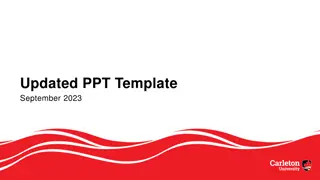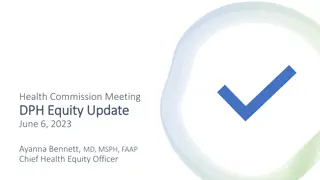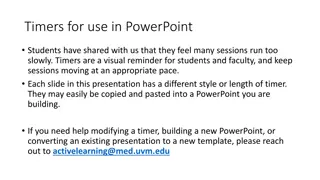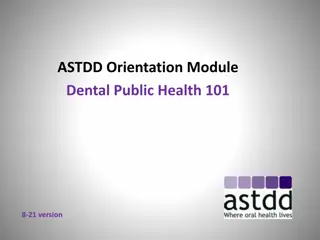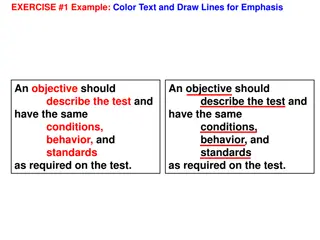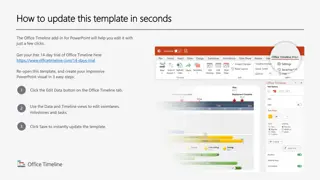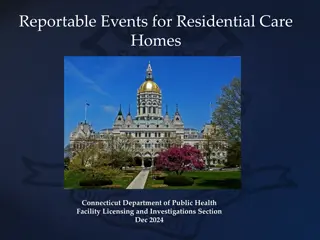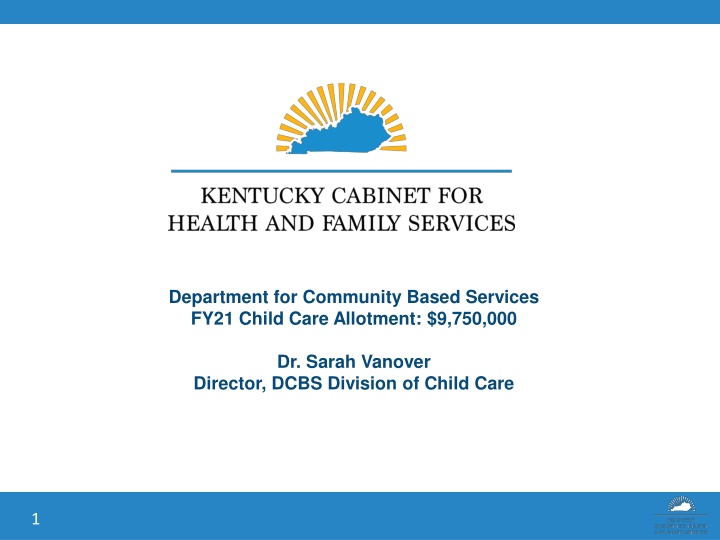
Kentucky Child Care Services and Quality Initiatives - Overview
Explore Kentucky's child care services and quality initiatives, including funding allocations, federal grants, Kentucky All STARS program, and high-quality standards for early childhood education programs. Learn about the support provided to families, child care workers, and the high-quality criteria for child care centers in Kentucky.
Download Presentation

Please find below an Image/Link to download the presentation.
The content on the website is provided AS IS for your information and personal use only. It may not be sold, licensed, or shared on other websites without obtaining consent from the author. If you encounter any issues during the download, it is possible that the publisher has removed the file from their server.
You are allowed to download the files provided on this website for personal or commercial use, subject to the condition that they are used lawfully. All files are the property of their respective owners.
The content on the website is provided AS IS for your information and personal use only. It may not be sold, licensed, or shared on other websites without obtaining consent from the author.
E N D
Presentation Transcript
Department for Community Based Services FY21 Child Care Allotment: $9,750,000 Dr. Sarah Vanover Director, DCBS Division of Child Care 1
Tobacco Settlement Funds in Community Based Services Child Care - $9,750,000 Early Childhood Adoption & Foster Care Supports - $2.5M FY21 Child Care Expenditures $8,790,855 Atypical expenditures due to COVID-19 2
The Child Care and Development Fund (CCDF) SFY21 allocation (mandatory & discretionary funds): $149,606,783 This federal grant is designed to promote success for children, employment for parents, and economic security for parents by ensuring stable, high quality child care. CCDF funds support the following initiatives in Kentucky: Child care subsidies for 16,359 families and 29,752 children Monitoring and supports for approximately 2,025 child care centers and family child care homes at any given time Professional development supports and background checks for 70,367 child care workers since February 2018 Special initiatives for infant and toddler care, disaster preparedness training and response, and consumer education Tobacco dollars serve as the entirety of the required matching funds for CCDF 3
What is Kentucky All STARS? Kentucky All STARS is Kentucky's five-star quality rating and improvement system for early childhood education programs. Child care programs participating in Kentucky All STARS demonstrate a commitment to quality by focusing on the following indicators: Family and community engagement Classroom and instructional quality Staff qualifications and professional development Administrative and leadership practices 4
Kentucky All STARS Levels by Provider Type Level 1 Level 2 Level 3 Level 4 Level 5 Total 144 28 23 21 6 222 CERTIFIED LICENSED TYPE I 832 120 321 278 184 1,735 LICENSED TYPE II 22 5 4 2 4 37 998 153 348 301 194 1,994 Total Child Care Assistance Program (CCAP) children currently enrolled in high quality (levels 3-5) centers: 9,173 5
High Quality Classrooms Healthy and safe facilities Low adult to child ratios Trained and experienced teachers Parent and family involvement Planned curriculum and developmental assessments Language-rich classrooms 7
Professional Development Initiatives In SFY21 tobacco settlement funds helped to support the following: 137 scholarships for Child Development Associates (CDA) 177 scholarships for Commonwealth Child Care Credential 64 mini grants for Child Development Associates 163 Milestone Achievement Awards 121 education reimbursement grants 8
How Does Kentucky Stand Out? Comprehensive professional registry Integrated systems to support quality (specifically public health support during COVID-19) Family child care network to support home-based child care Monetary incentives for high quality Balanced approach to Child Care and Development Fund (CCDF) mandated activities 9
Department for Public Health Early Childhood Programs Supported with MSA Funds FY22 Paula Goff Elizabeth Goode Division of Maternal and Child Health Division of Prevention and Quality Improvement
Dental Fluoride Varnish Provision (Amount of Tobacco Funding: FY22 $1,013,200) Purpose: Provides funding for non-Medicaid children health department patients for fluoride varnish. Provides the kits to health departments for all varnish services. Supports training by providing teaching materials, technical manuals, and demonstration varnish kits. Structure: 34 health departments are supported with this funding for unpaid services and kits for all. The program holds day-long required training for public health nurses. Funds to the health departments have remained stagnant over the years, but were increased by 50% for FY22 because of evidence of early balance use in recent years. Experience In FY 21 (unusual year with LHD COVID response), approximately 8,000 services were provided through this funding. In FY 21 (unusual year due to meeting limitations), four sessions of training were provided via a $147,000 contract with the University of Kentucky College of Dentistry. The remainder of this amount was carried over for a future project. 11
Early Childhood Mental Health (ECMH) (Amount of Tobacco Funding: FY22 $965,000) Purpose: To build capacity to meet the mental health needs of young children and their families by partnering with the Departments for Public Health and Behavioral Health, Developmental and Intellectual Disabilities. Structure: Funds support Early Childhood Mental Health specialists in fourteen comprehensive community mental health centers (CMHC) and one administrator. Served 942 children and families in FY21, a decrease of 26% from FY20. Services were provided through telehealth, which is difficult to use with children under the age of five. Provided 2,982 consultations to child-serving agencies. Provided training to over 1,600 early care and education staff in Head Start, childcare, and state-funded preschool. 12
Healthy Start (Child Care Health Consultation) (Amount of Tobacco Funding: FY22 $965,000) Purpose: To provide technical assistance and training on health, safety, and social-emotional development to licensed and certified child care providers statewide. Structure: Funds support ten regional health consultants and two consultant trainers. Regional staff are housed through local health departments with the consultant trainers located at the Technical Assistance Center at the Fayette County Health Department. CCHC consultants provided training to 1,694 child care providers, an increase of 21% from FY20, impacting over 10,000 children in care. CCHC consultants fielded numerous calls from child care providers regarding the COVID-19 pandemic and assisted child care providers in remaining an open, safe environment for staff and children. CCHC consultants also provided 156 trainings to child care providers. 13
Health Access Nurturing Development Services (HANDS) (Amount of Tobacco Funding: FY22 $7,000,000) Purpose: Voluntary weekly home visiting program designed to assist overburdened parents/caregivers during the prenatal period until the child s third birthday. Goals include improving health and social outcomes for both mother and child. Structure: HANDS is administered through local health departments and one contract (Jefferson County). In FY21, 3,221 families were served through support of tobacco settlement funds primarily through telehealth. This is a decrease of 22% from FY20. FY21 indicates a decrease in services from FY20 due to impact of pandemic. Referrals to HANDS were low most likely due to parents not frequenting primary referral sources such as physicians, health departments, and other community services. Telehealth was beneficial, but had limitations in certain populations. All Tobacco MSA-funded program services are increasing as we move out of the pandemic. Due to the pandemic, there is a bigger need for mental health supports. 14
Questions? For questions or information related to this presentation, please contact: Kelli Rodman (kelli.rodman@ky.gov) Office of Legislative and Regulatory Affairs Executive Director (502) 564-7042 15

